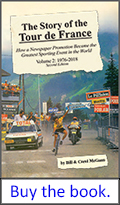

Five Favorite Cycling Coaching Tips from Five Cyclng Coaches
Back to list of our training, coaching and nutrition essays
Bill & Carol McGann's book The Story of the Tour de France, Vol 2: 1976 - 2018 is available as an audiobook here.
Hunter Allen's Peaks Coaching Group sent me this fun and informative piece.
Jill Patterson
Alexandria, VA — Coaching Focus: Cycling – Road – Gravel – Racing

1. Be consistently inconsistent: try to train at least 4 days a week to see improvements…but don’t do the same thing all the time and expect to get better! Mix up your training on a regular basis to create new stimulus to your body.
2. Don’t underestimate the importance of proper fueling hydration and nutrition: training hard and being in top physical condition will get you nowhere if you don’t give your body the food and drink it needs to perform best. “Train” your hydration and nutrition just as hard as you train your body!
3. Pick people’s brains…but use your own brain as the final judgement call: athletes are a wealth of information, and you can learn a lot from talking with them and asking about what works and what doesn’t work for them. But everyone is different, so what works for one person might not work for you. Talk with many different people, explore different resources, try many different things, and then pick and choose what is best for YOU.
4. Women are not small men: Women need to approach training differently than men! If you are a woman, or if you are a man who has a female athlete in his life, please read Roar by Stacy Sims.

Lian Lippert wins the Cadel Evans Women's Great Ocean Road Race. Her coaches obviously got things right.
5. Weight-train: focusing solely on just one or a few sports can create imbalances in the body over time. If you care about general health and longevity (and it’s my guess that you DO!), it is crucial that you train the muscles that your sport ignores or repetitively stresses. I recommend working with a personal trainer for a few sessions (or regularly) so (s)he can diagnose any weaknesses or imbalances and give you specific exercises to correct them. By the way, weight training is extremely important for women…see #4…read Roar to find out why!!
Todd Scheske
Rochester, NY — Coaching Focus: Road, Crit, TT, Track, CX, Juniors
1. Listen to your body
2. Success takes time. Its like turning a ship. Cycling takes time to get good, so be patient with yourself. Trust the process
3. When you think you are done, your body almost always has more. Check in with yourself and see if you truly are done or could you do more.
4. In any race ask yourself three questions: What am I doing? Why am I doing that? What am I going to do next?
5. Look up, look around, be aware. Don’t stare at hubs in front of you. Be aware of where you are and where others are, how they sound, where’s the wind….
David Ertl
Waukee, Iowa — Coaching Focus: Road, Gravel, MTB, CX, TT
1. Consistency is king. It may be less important how you train than that you are consistent with it.
2. Every ride should have a purpose. Be sure you know what it is every time you throw your leg over your bike.
3. Resting is as important as training (training tears your body down; recovery is when you get stronger)
4. Miles matter – lots of hoopla on High Intensity Interval Training – HIIT (although cyclists have been doing intervals for decades). But you gotta put in the time. But intensity matters too. You can’t just do one or the other.
5. To ride faster you have to train faster, or as one infamous (ex)Tour de France winner once said, ‘train harder than you race’.
BJ Basham
Fairfax, VA — Road, Crit, MTB, Gravel, Time Trial, CX Fairfax, Virginia
1. Don’t overly focus on the power numbers. The point of training to ride is to ride faster.
2. Do core stability every day.
3. As you get older you can still go hard, you just can’t make as many mistakes as when you were younger and get away with it.
4. There will be good days and bad days as you build fitness. If every day is doable and easy then you are likely not challenging yourself enough and maybe missing out on potential improvements.
5. Rest days are the big difference between just riding and following a structured training program. It can be very doable to ride every day and just be kind of riding hard and feeling kind of tired. If you never feel like you need to rest then you are likely not training hard enough or long enough or just enough. Have your rest days planned but listen to your body. If you ever feel too tired to go training, call me and I will tell you not to.
Rickey Wray Wilson
Fort-Worth, TX — Coaching Focus: Road, TT, Gravel, Master’s, Ultra-Endurance Road, CompuTrainer
1. Listen to your body first and always.
2. Coach, my Readiness score says I’m rested and ready to go and you have a hard workout scheduled, but I feel terrible, what should I do? Refer to #1.
3. The best way to know if you are truly doing a Recovery pace ride (I’m embarrassed to be seen going this slow).
4. When riding in a pack, recreational or race, picture yourself with antenna pointed out in every direction, looking for any signals of danger to staying upright and safe (someone with poor bike handling skills, switching lines frequently, not paying attention).
5. Learn proper bike handling skills by attending a skills clinic, and then practice them, even if you are an experienced cyclist.
Hunter Allen is a USA Cycling Level 1 coach and former professional cyclist. He is the coauthor of “Training and Racing with a Power Meter” and “Cutting-Edge Cycling,” co-developer of TrainingPeaks’ WKO software, and CEO and founder of Peaks Coaching Group. He and his coaches create custom training plans for all levels of athletes.
.








